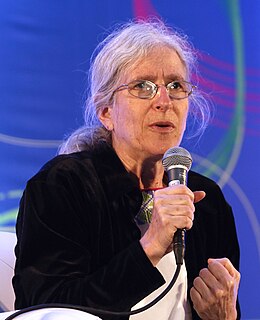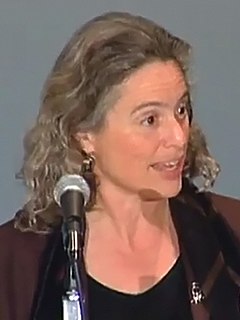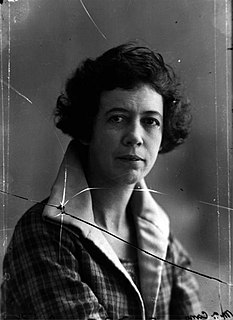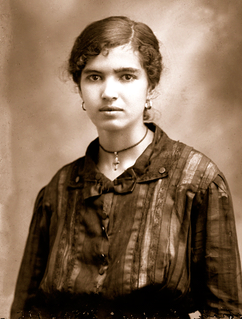Related Research Articles

Alma Guillermoprieto is a Mexican journalist. She has written extensively about Latin America for the British and American press, especially The New Yorker and The New York Review of Books. Her writings have also been widely disseminated within the Spanish-speaking world and she has published eight books in both English and Spanish, and been translated into several more languages.

One Hundred Years of Solitude is a 1967 novel by Colombian author Gabriel García Márquez that tells the multi-generational story of the Buendía family, whose patriarch, José Arcadio Buendía, founded the (fictitious) town of Macondo. The novel is often cited as one of the supreme achievements in world literature.
Anne Tyler is an American novelist, short story writer, and literary critic. She has published twenty-three novels, including Dinner at the Homesick Restaurant (1982), The Accidental Tourist (1985), and Breathing Lessons (1988). All three were finalists for the Pulitzer Prize for Fiction, and Breathing Lessons won the prize in 1989. She has also won the Janet Heidinger Kafka Prize, the Ambassador Book Award, and the National Book Critics Circle Award. In 2012 she was awarded The Sunday Times Award for Literary Excellence. Tyler's twentieth novel, A Spool of Blue Thread, was shortlisted for the Man Booker Prize in 2015, and Redhead By the Side of the Road was longlisted for the same award in 2020. She is recognized for her fully developed characters, her "brilliantly imagined and absolutely accurate detail", her "rigorous and artful style", and her "astute and open language."

Gloria Evangelina Anzaldúa was an American scholar of Chicana cultural theory, feminist theory, and queer theory. She loosely based her best-known book, Borderlands/La Frontera: The New Mestiza, on her life growing up on the Mexico–Texas border and incorporated her lifelong experiences of social and cultural marginalization into her work. She also developed theories about the marginal, in-between, and mixed cultures that develop along borders, including on the concepts of Nepantla, Coyoxaulqui imperative, new tribalism, and spiritual activism.

Aviva Chomsky is an American teacher, historian, author, and activist. She is a professor of history and the Coordinator of Latin American, Latino and Caribbean Studies at Salem State University in Massachusetts. She previously taught at Bates College in Maine and was a Research Associate at Harvard University, where she specialized in Caribbean and Latin American history.
Denise Giardina is an American novelist. Her book Storming Heaven was a Discovery Selection of the Book-of-the-Month Club and received the 1987 W. D. Weatherford Award for the best published work about the Appalachian South. The Unquiet Earth received an American Book Award and the Lillian Smith Book Award for fiction. Her 1998 novel Saints and Villains was awarded the Boston Book Review fiction prize and was semifinalist for the International Dublin Literary Award. Giardina is an ordained Episcopal Church deacon, a community activist, and a former candidate for governor of West Virginia.

Ruth Milkman is an American sociologist of labor and labor movements. She is Distinguished Professor of Sociology at the Graduate Center, CUNY and the director of research at CUNY School of Labor and Urban Studies. Between 1988 and 2009 Milkman taught at the University of California, Los Angeles, where she directed the UCLA Institute for Research on Labor and Employment.
Gregg Andrews is a professor of history and labor historian at Texas State University. Additionally, he is assistant director of the Center for Texas Music History and assistant director and co-editor of the Journal of Texas Music History. Andrews is also an accomplished folk musician, performing and recording under the pseudonym "Doctor G" alongside his band, The Mudcats.

Héctor Abad Faciolince is a Colombian novelist, essayist, journalist, and editor. Abad is considered one of the most talented post-Latin American Boom writers in Latin American literature. Abad is best known for his bestselling novel Angosta, and more recently, El Olvido que Seremos.

Gabriel José de la Concordia García Márquez was a Colombian novelist, short-story writer, screenwriter, and journalist, known affectionately as Gabo or Gabito throughout Latin America. Considered one of the most significant authors of the 20th century, particularly in the Spanish language, he was awarded the 1972 Neustadt International Prize for Literature and the 1982 Nobel Prize in Literature. He pursued a self-directed education that resulted in leaving law school for a career in journalism. From early on he showed no inhibitions in his criticism of Colombian and foreign politics. In 1958, he married Mercedes Barcha Pardo; they had two sons, Rodrigo and Gonzalo.

Stuart Leonard Pimm is an American-British biologist and theoretical ecologist specializing in scientific research of biodiversity and conservation biology.
Barbara Weinstein is a professor of Latin American and Caribbean history at New York University. Her research interests include race, gender, labor, and political economy, especially in relation to the making of modern Brazil.

Juan Gabriel Vásquez is a Colombian writer, journalist and translator. Regarded as one of the most important Latin American novelists working today, he is the author of seven novels, two volumes of stories and two books of literary essays, as well as hundreds of pages of political commentary. His novel The Sound of Things Falling, published in Spanish in 2011, won the Alfaguara Novel Prize and the 2014 International Dublin Literary Award, among other prizes. In 2012, after sixteen years in Paris, the Belgian Ardennes and Barcelona, Vásquez moved back to Bogotá. His novels are currently published in 28 languages.
Conference on Latin American History, (CLAH), founded in 1926, is the professional organization of Latin American historians affiliated with the American Historical Association. It publishes the journal The Hispanic American Historical Review.
Patricia Zavella is an anthropologist and professor at the University of California, Santa Cruz in the Latin American and Latino Studies department. She has spent a career advancing Latina and Chicana feminism through her scholarship, teaching, and activism. She was president of the Association of Latina and Latino Anthropologists and has served on the executive board of the American Anthropological Association. In 2016, Zavella received the American Anthropological Association's award from the Committee on Gender Equity in Anthropology to recognize her career studying gender discrimination. The awards committee said Zavella’s career accomplishments advancing the status of women, and especially Latina and Chicana women have been exceptional. She has made critical contributions to understanding how gender, race, nation, and class intersect in specific contexts through her scholarship, teaching, advocacy, and mentorship. Zavella’s research focuses on migration, gender and health in Latina/o communities, Latino families in transition, feminist studies, and ethnographic research methods. She has worked on many collaborative projects, including an ongoing partnership with Xóchitl Castañeda where she wrote four articles some were in English and others in Spanish. The Society for the Anthropology of North America awarded Zavella the Distinguished Career Achievement in the Critical Study of North America Award in the year 2010. She has published many books including, most recently, "I'm Neither Here Nor There, Mexicans"Quotidian Struggles with Migration and Poverty, which focuses on working class Mexican Americans struggle for agency and identity in Santa Cruz County.

María de los Ángeles Cano Márquez was a Colombian poet and writer who was the country's first female political leader. Called the "Flor del trabajo", Cano led the struggle for basic civil rights and for the rights of salaried workers. She was the leader of several workers' strikes and a co-founder of the Socialist Revolutionary Party.
Ann Twinam is an American historian of colonial Latin America.
Paul Ortiz is an American historian. Ortiz is a professor of history at the University of Florida and is Director of the Samuel Proctor Oral History Program.

Betsabé Espinal, also erroneously known as Betsabé Espinosa or Espinoza, was a Colombian labor rights activist and leader of a 1920 workers' strike against a fabric factory in Bello, Colombia. Although not the first strike in Colombian history, it was the first strike led by women. The strike was considered to have made a significant impact on the rights of female workers thereafter.
Rebecca Earle is a historian, specialising in the history of food and colonial and 19th-century Spanish America. She is a professor in the Department of History at the University of Warwick.
References
- ↑ Roldan, Mary. Book Review: Dulcinea in the Factory, Hispanic American Historical Review 81.2 (2001) 406-408
- ↑ "CLAH » Prize and Award Descriptions".
- ↑ Durham: Duke University Press 2017